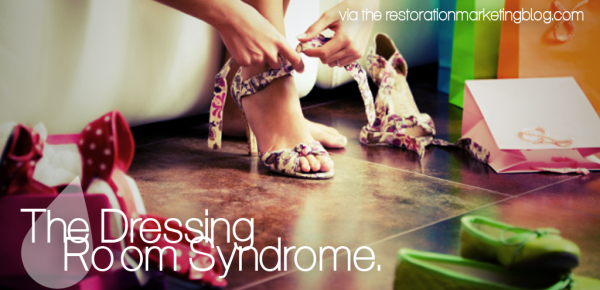I walked into the clothing store, they know me here. I come in often to try on an assortment of random clothes hoping they hit all the necessary body parts just right while avoiding all the “unnecessary” ones (if you know what I mean, ladies). I walked out of the dressing rooms in some flowery dress and heels towards the 360 degree mirror hoping to find the ultimate perfect outfit I would realize I couldn’t live the rest of my life without. No dice. I looked like a worm attempting to break out of a sewed up cocoon made out of flowers. Anyways, back to the dressing room to try on 10 other outfits I’d picked out (I’m the restocking person’s worst nightmare). Before I had a chance to make it back to my clothing jail cell, a salesperson caught me doing the walk-of-shame in the constricting clothes.
“Oh my, if I looked like that, I wouldn’t possibly leave this store without that in hand!” Was this lady really telling me this outfit looked good?!
“Um, yeah… It’s way too tight. I had to dislodge three joints to get it over my head. I’m dreading taking it off.” I replied in a less-than-enthusiastic response.
“Oh, no honey! That dress is made for you!” she responded in an almost unrealistically happy tone.
I was skeptical. This chick was trying to sell me on an outfit that didn’t take a blind man to realize was not figure flattering. But on she continued to woo me into buying this dress. I thanked her for the compliments, told her I’d think about it, and walked back to the dressing room to reason it out. This woman was trying to tell me I looked great so I’d buy the outfit she would make her commissions off of. Plain and simple. Had another woman walked out of the dressing room next to me and drooled on and on about how the dress made me look like a candidate for the next Victoria Secret Runway Show, I may have actually bought the dress because that opinion would have been sincere.
Was the sales lady lying? I don’t know. But it didn’t matter, she was there to make a profit and I was just a sales number to her (in my eyes, at least).
How does my story recounting my shopping addiction apply to restoration marketing, you ask? Glad you did. When you get on your Facebook page and write constantly about how you’re the best restoration company in the whole wide world, you are that sales lady telling me that that outfit looked good when I needed to here it from another customer, not the store representative.
I logged onto linkedin this morning and read a quote from some connection. “In the restoration insurance industry, you need to know a professional. We are that professional – best in the business. Call (555) 555-5555.” Ok, um, great. You think you’re the bees knees. But what do your clients think? Are they on Yelp writing a “RUN THE OTHER WAY” review? I don’t care how awesome you think you are. I care about how awesome other people think you are.
Instead of logging onto some social network every morning to make your daily post about how epic your workmanship is, try asking someone else to. “Asking someone else to!?” you respond nearly spitting your drink across your computer screen. YES. Ask, and ye shall receive. Call up your last client. Let them know a review on Yelp would mean the world or an Angie’s list write-up would be the cherry on top. Waiting for them to write your epic review is like me waiting in the dressing room for someone to just happen to notice my outfit and comment on it. I’d probably be writing this from that dressing room if I’d waited.
Conclusion : let others “toot your horn.”
FAQ
What is “The Dressing Room Syndrome”?
“The Dressing Room Syndrome” is a term used by the author to describe the negative self-talk and feelings of insecurity that can arise when trying on clothes in a dressing room.
What are some common experiences associated with “The Dressing Room Syndrome”?
Common experiences associated with “The Dressing Room Syndrome” include feeling self-conscious about one’s body, criticizing oneself for not looking like the models in clothing advertisements, and feeling discouraged by the lack of sizes or styles that fit properly.
How can “The Dressing Room Syndrome” affect one’s self-esteem?
“The Dressing Room Syndrome” can affect one’s self-esteem by reinforcing negative beliefs and self-talk about one’s body and appearance, which can lead to feelings of shame, anxiety, and low self-worth.
What are some strategies for overcoming “The Dressing Room Syndrome”?
Strategies for overcoming “The Dressing Room Syndrome” include focusing on the fit and comfort of clothing rather than the size or appearance, practicing positive self-talk and affirmations, and recognizing that clothing sizes and styles vary widely and are not indicative of one’s worth or beauty.
How can clothing retailers and brands address “The Dressing Room Syndrome”?
Clothing retailers and brands can address “The Dressing Room Syndrome” by promoting body positivity and diversity in their advertising and marketing campaigns, offering a range of sizes and styles that cater to a diverse range of body types, and creating a welcoming and inclusive shopping environment that values the unique beauty of all individuals.
How does “The Dressing Room Syndrome” relate to broader issues of body image and self-esteem?
“The Dressing Room Syndrome” is related to broader issues of body image and self-esteem because it highlights the negative impact that societal beauty standards and unrealistic expectations can have on individuals’ perceptions of themselves and their bodies.
What are some resources or organizations that can help individuals struggling with body image and self-esteem issues?
Resources and organizations that can help individuals struggling with body image and self-esteem issues include therapy or counseling services, support groups such as Body Positive or National Eating Disorders Association, and online resources such as the National Institute of Mental Health’s website.


















The Dressing Room Syndrome is a thought-provoking article that sheds light on an issue that affects many people – feeling dissatisfied with our appearances. The author presents a compelling argument for why we should be kinder to ourselves and our bodies, and offers practical advice for overcoming negative self-talk.
The Dressing Room Syndrome is an excellent article that sheds light on the psychological factors that influence our purchase decisions. The author does a great job of explaining why we may feel insecure and indecisive when buying clothes and how we can overcome these feelings.
The Dressing Room Syndrome is an insightful article that raises awareness about a common phenomenon among consumers. The author skillfully explores the psychological factors that contribute to this issue and suggests practical ways to overcome it.
In The Dressing Room Syndrome, the author uses real-life examples to illustrate how our perception of ourselves can be influenced by our environment. This article is a must-read for anyone who wants to develop a healthy body image and make informed shopping decisions.
This article is a must-read for anyone who has ever struggled with body image issues. The author’s personal anecdotes and insights are relatable and inspiring, and the tips for combating negative self-talk are simple yet effective.
This article is a must-read for anyone who is interested in marketing or psychology. It explores the concept of The Dressing Room Syndrome and provides practical tips on how businesses can make their customers feel more confident and satisfied with their purchases.
The Dressing Room Syndrome is a timely reminder of the damaging effects that societal beauty standards can have on our mental health. The author’s call to action for a more inclusive and accepting definition of beauty is both empowering and necessary.
I found The Dressing Room Syndrome to be a thought-provoking read. The author delves into the reasons why we sometimes feel insecure and self-conscious when trying on clothes, and offers tips on how to cope with these feelings. Overall, this article is informative and empowering.
I found this article to be very insightful and thought-provoking. It makes a strong case for the importance of understanding the emotional needs of consumers and tailoring marketing strategies accordingly.
The Dressing Room Syndrome is a well-written and engaging piece that provides a fresh perspective on the shopping experience. I appreciated the author’s use of real-world examples and research-based insights to support their arguments.
As a marketing professional, I found The Dressing Room Syndrome to be a valuable resource. The article sheds light on the importance of creating a positive shopping experience for customers, and provides insights into how businesses can make their dressing rooms more inviting and comfortable.
As someone who has frequently experienced The Dressing Room Syndrome, I found this article to be both comforting and enlightening. The author’s message of self-love and body positivity is one that resonates deeply, and the practical advice provided is invaluable.
The Dressing Room Syndrome is a well-written and engaging article that sheds light on a topic that many people can relate to. I appreciated the author’s practical advice on how to overcome negative self-talk and build confidence, and would recommend this article to anyone who struggles with body image issues.
As someone who has struggled with body image issues in the past, I found this article to be particularly relevant and helpful. It offers valuable advice on how to combat negative self-talk and feel more confident when trying on clothes. Overall, I highly recommend this article to anyone interested in marketing or personal development.
Overall, The Dressing Room Syndrome is a powerful and insightful piece that tackles a pervasive issue in our society. The author’s honesty and vulnerability make this article a must-read for anyone seeking to improve their relationship with their body and self-image.